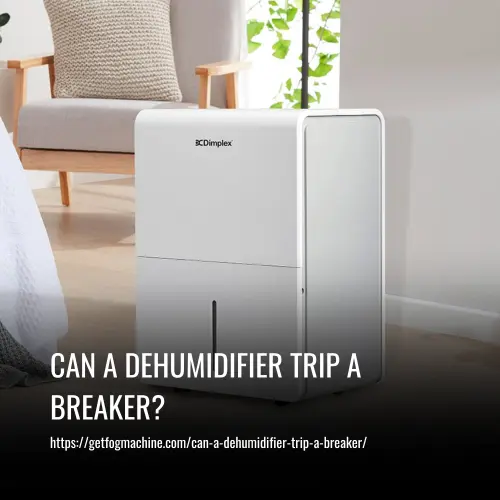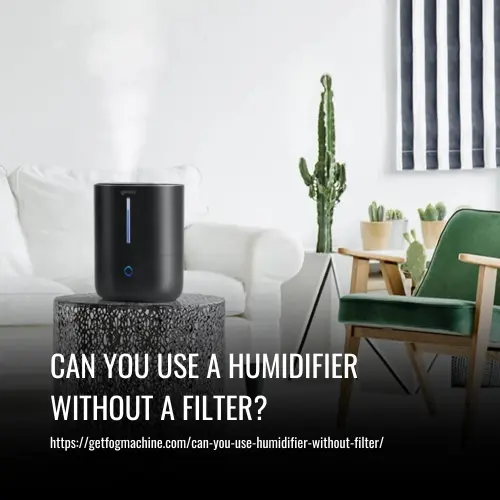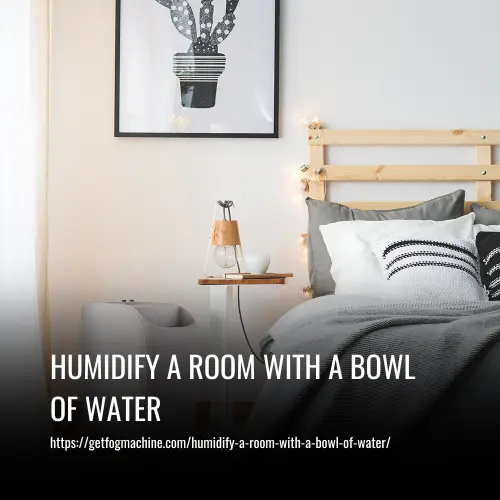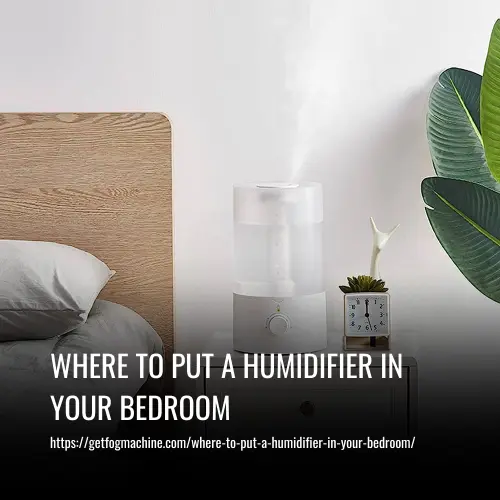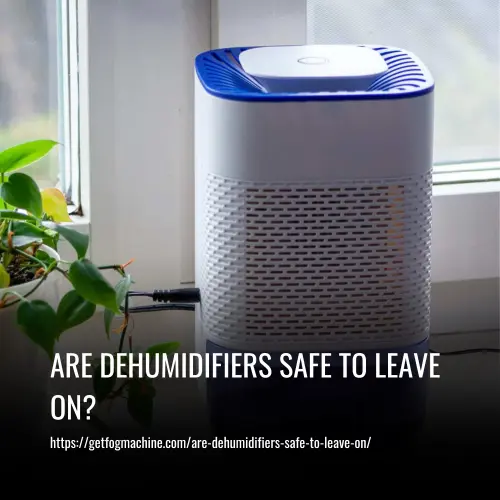Can You Use an Air Purifier and Humidifier Together?
This post contains affiliate links. As an Amazon Associate, we earn from qualifying purchases.
Yes, you can use an air purifier and humidifier together without any issues. Air purifier filters are designed to function effectively in various humidity levels, so the additional moisture from the humidifier will not cause any damage. Using both devices simultaneously can help improve indoor air quality by removing airborne particles and maintaining an optimal level of humidity.
This combination can alleviate dry skin, nasal irritation, sore throats, and respiratory issues caused by dry air, while also minimizing airborne allergens, mold spores, and other harmful contaminants. Whether it’s a cool mist or warm mist humidifier, using it alongside an air purifier can enhance the overall comfort and health of your indoor environment.
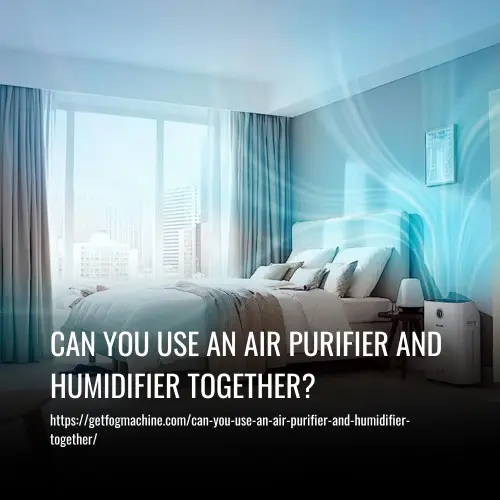
Humidifier vs Air Purifier
Humidifiers and air purifiers serve different purposes in enhancing indoor air quality. While air purifiers filter harmful particles from the air, humidifiers maintain a suitable humidity level (around 30% to 50%).
The question arises: can you use a humidifier with an air purifier? The answer is yes, and in fact, using them together can be beneficial for your overall comfort and well-being.
Uses of a Humidifier
1. Dry Skin: A humidifier adds moisture to the air, preventing your skin from becoming dry and itchy.
2. Asthma Attacks: Adequate indoor humidity can help reduce the frequency and severity of asthma attacks.
3. Snoring and Sinus Congestion: Dry air can cause nasal passages to become congested and lead to snoring. A humidifier keeps the air moist, alleviating these issues.
4. Frequent Nose Bleeding: Dry air can cause the delicate blood vessels in your nasal passages to crack, leading to nosebleeds. A humidifier adds moisture to the air, preventing this problem.
5. Cold, Sore Throat, and Irritating Eyes: Dry air can worsen symptoms of colds, cause sore throats, and irritate the eyes. A humidifier helps alleviate these discomforts.
Uses of an Air Purifier
1. Dust: Air purifiers effectively capture and remove dust particles in your home, improving the overall air quality.
2. Shortness of Breath: If you experience difficulty breathing in your home, an air purifier can help by reducing airborne contaminants such as smoke particles, mold spores, and pet dander.
3. Odor Control: Air purifiers are effective in eliminating unpleasant odors caused by chemicals, paint, varnish, and smoking in the house.
4. Respiratory Issues: Air purifiers can help alleviate respiratory issues, such as allergies and asthma symptoms, by removing airborne allergens and other harmful particles from the air.
5. Pet Hair: If you have pets, an air purifier can help to remove pet hair and dander from the air, reducing allergic reactions and improving air quality.
Humidifier and Air Purifier Combo
Using a humidifier and air purifier together can provide numerous benefits for your indoor environment. Combining these two devices offers stress-relieving and therapeutic functions, leaving you in a good mood throughout the day. Furthermore, most of these air purifier humidifier combos are portable and come with exceptional features like digital screens, making them convenient to use.
One of the significant advantages of using a humidifier and air purifier combo is cost-effectiveness. Instead of purchasing two separate appliances, you can enjoy the services of both in a single device, saving you money. Additionally, these combos can help reduce energy consumption, further contributing to cost savings.
The air purifier component of these devices not only filters out airborne particles, such as mold spores and smoke particles but also eliminates harmful contaminants, improving indoor air quality. On the other hand, the humidifier function adds moisture to the air, preventing dryness that can cause issues like dry skin, sore throats, nasal irritation, and respiratory problems.
By using a humidifier and air purifier together, you can create a clean and comfortable indoor environment, free from viruses, bacteria, and airborne allergens. Moreover, these devices can provide air freshening capabilities, leaving your home smelling pleasant.
How Does A Humidifier And Air Purifier Work
Humidifiers work by increasing the humidity level in a room, which helps alleviate dry skin, nosebleeds, coughs, and other respiratory issues. They release moisture into the air through evaporation, ultrasonic technology, or steam. Air purifiers, on the other hand, remove pollutants and contaminants from the air such as dust, pet dander, pollen, smoke, mold, and bacteria.
They use filters to trap these particles and prevent them from circulating in the air. Some air purifiers, like the IQAir HealthPro Series, go a step further by using a HyperHEPA filter to remove ultrafine particles as small as 0.003 microns and gas-phase filtration to remove volatile organic compounds (VOCs) and other gases. Together, humidifiers and air purifiers work to improve indoor air quality and promote a healthier living environment.
Is It Okay to Use an Air Purifier and a Humidifier Together
Yes, it is okay to use an air purifier and a humidifier together. An air purifier helps remove contaminants from the air, while a humidifier adds moisture to the air. These two devices have complementary functions and using them together can help maintain a comfortable humidity level while purifying the indoor air.
This combination is especially beneficial during the winter months when the air tends to be dry, leading to issues such as dry skin, sore throats, and nasal irritation. By using an air purifier and humidifier together, you can improve indoor air quality and create a healthier living environment.
How Do Air Purifiers And Humidifiers Impact Your Health
Air purifiers are designed to remove airborne pollutants such as dust, pet dander, pollen, mold spores, and smoke particles. They work by drawing in the air, filtering it through various layers of filters (including carbon filters and HEPA filters), and then releasing clean air back into the room. By reducing the level of airborne contaminants, air purifiers can help alleviate symptoms of allergies, asthma, and other respiratory issues.
On the other hand, humidifiers add moisture to the air, especially during the dry winter months or in arid climates. They help maintain an optimal level of humidity in the room, which can prevent dry skin, nasal irritation, and sore throats. By keeping the air moist, humidifiers can also help ease respiratory symptoms related to colds, allergies, and sinus congestion.
Using an air purifier and humidifier together can further enhance indoor air quality and promote overall well-being. The air purifier can effectively eliminate harmful particles and pollutants, while the humidifier can maintain an ideal level of humidity, creating a comfortable and healthy living environment.
Benefits of Using an Air Purifier and Humidifier Together
Using an air purifier and humidifier together can offer several benefits for your indoor air quality and overall health. Here are some of the key advantages:
1. Perfect for Winter
During the winter months, the air both outside and inside tends to become dry. This can lead to problems such as static electricity, cracked skin, and respiratory issues. By using an air purifier, you can remove contaminants from the air, while a humidifier adds moisture to maintain a comfortable level of humidity in your home throughout the winter season.
2. Energy Cost Savings
When you use an air purifier and humidifier together, the humidifier helps regulate the temperature in your home. This means you won’t have to use your heating or cooling system as much, resulting in energy cost savings on your bills.
3. Ideal for Allergy Seasons
Allergy seasons are characterized by high levels of pollen and other allergens in the air. This can be especially challenging for individuals with allergies. Combining an air purifier and a humidifier can effectively remove allergens from the air and add moisture, helping you breathe easier and reducing allergy symptoms.
4. Improved Overall Health
Maintaining a balanced level of humidity in your home is essential for your health. Excess humidity can lead to the growth of mold and mildew, while insufficient humidity can cause respiratory problems. By using a combination of an air purifier and a humidifier, you can maintain optimal humidity levels, promoting easier breathing and reducing the risk of respiratory issues.
Factors to Consider When Running a Humidifier and an Air Purifier Together
Using a humidifier and air purifier together can provide several benefits for your indoor air quality and overall health. However, there are a few factors to consider to ensure their optimal functionality and effectiveness:
1. Humidity Levels
It is crucial to maintain the appropriate humidity level in your home. According to the Environmental Protection Agency, the ideal range is between 30% to 60%. Avoid exceeding 50% humidity in summer to prevent bacteria growth, and do not let it exceed 60% in winter to avoid mold and bacteria proliferation.
2. Placement
To maximize the functionality of both appliances, place the air purifier and humidifier far apart from each other. This way, the water droplets from the humidifier won’t interfere with the air purifier’s filters. Optimal placement is on opposite sides of the room.
3. Timing
The best time to use both appliances simultaneously is during allergy and winter seasons. During winter, the humidifier adds moisture to combat dry air caused by heating systems. By combining it with an air purifier, you can minimize the effects of air pollution. In the spring and fall, the air purifier helps remove pollen, while the humidifier alleviates nasal irritation caused by dry air.
4. Humidity on HEPA Air Filters
Ensure that the overall humidity in the room does not exceed 60% to prevent the inefficiency of HEPA air filters. Excessive moisture can promote fungal growth and increase fungal spores in the air.
5. Use a Separate Air Quality Sensor
Consider using separate air quality sensors that utilize laser diffraction technology for accurate results when using both appliances together. Infrared sensors, commonly found in humidifiers, may not provide accurate measurements.
6. Regular Cleaning
Clean both the humidifier and air purifier regularly. Moisture from the humidifier can promote the growth of mold and mildew, while contaminants can accumulate on the air purifier’s filters. Regular cleaning ensures optimal performance and prevents health risks.
7. Research Before Purchase
Before buying an air purifier and humidifier, conduct research to find the best options based on your home’s size, budget, and specific needs.
8. Follow the Manufacturer’s Instructions
Each device comes with its own set of instructions. Following the manufacturer’s instructions ensures the safe and effective use of both appliances.
Using a humidifier and air purifier together can significantly enhance indoor air quality and promote better health. By considering these factors, you can create a clean, comfortable, and healthy environment in your home.
FAQs
It depends on your needs. If you want to remove allergens from the air, an air purifier is a good option. If you’re looking to add moisture to the air, a humidifier is a better choice.
Yes, you can use an air purifier and humidifier together. Just make sure to keep the devices as far apart as possible to prevent the humidifier from reducing the air purifier’s efficiency.
Yes, these devices perform different functions. A humidifier adds moisture to the air, while an air purifier removes contaminants. Using both can improve your indoor air quality.
Some hospital-grade air purifiers with high-quality HEPA filters can remove the COVID-19 virus from the air.
No, these devices have different functions. Humidifiers add moisture to the air, while air purifiers remove pollutants and allergens.
These appliances perform different duties, so one isn’t necessarily better than the other. Air purifiers are generally useful for reducing pollutants, while humidifiers add moisture to the air.
Humidifiers themselves do not clean the air, but they can help combat dry skin and nasal passages. It’s important to clean and use distilled water to prevent the release of mineral particles and mold into the air.
While they are not a cure, using a humidifier can help moisturize the air and alleviate coughing, while an air purifier can remove airborne pollutants that can aggravate bronchitis symptoms.
No, humidifiers do not clean the air. They only add moisture to the air and do not remove pollutants or allergens. To ensure clean air, it is recommended to use an air purifier along with a humidifier.
Air purifiers do not add or remove moisture from the air. However, they can make the air feel drier. In dry climates, using an air purifier without a humidifier can potentially reduce moisture levels. So, if your home tends to be overly dry, it is advisable to use both an air purifier and a humidifier.
Humidifiers add moisture to the air to alleviate dryness, while air purifiers remove pollutants and allergens. They serve different purposes and are not interchangeable. Depending on your needs, you may require one or both devices to address specific air quality concerns.
Determining whether you need both a humidifier and an air purifier depends on your location, air quality concerns, and personal health needs. If you live in a dry climate, a humidifier can add moisture to the air and alleviate dry skin and respiratory problems. An air purifier is beneficial for removing pollutants and allergens. Assessing your specific air quality needs will help determine whether you need both devices.
Yes, it is safe to use an air purifier and a humidifier together in the same room. They serve different purposes – the air purifier removes pollutants, while the humidifier adds moisture to the air. By using both devices, you can improve the overall air quality and humidity in the room.
Both humidifiers and air purifiers can benefit your health but in different ways. If you have allergies, asthma, or respiratory/lung issues, an air purifier is recommended. It helps remove pollutants and allergens from the air. A humidifier is useful for adding moisture to the air and alleviating dryness. Depending on your specific needs, choose the device that best addresses your health concerns.
Conclusion
In conclusion, it is safe and beneficial to use an air purifier and humidifier together. While they serve different purposes, they can work together to improve indoor air quality and create a comfortable living environment.
Air purifiers are effective in removing airborne particles such as dust, pollen, smoke, and pet dander. They use filters, including carbon filters, to capture these harmful contaminants. On the other hand, humidifiers add moisture to the air, reducing dryness and promoting healthy skin and respiratory functions.
Using an air purifier and humidifier together can help alleviate symptoms like dry skin, sore throats, nasal irritation, and respiratory issues. The air purifier can remove airborne allergens and contaminants, while the humidifier can maintain an optimal level of humidity, especially during the dry winter months.


